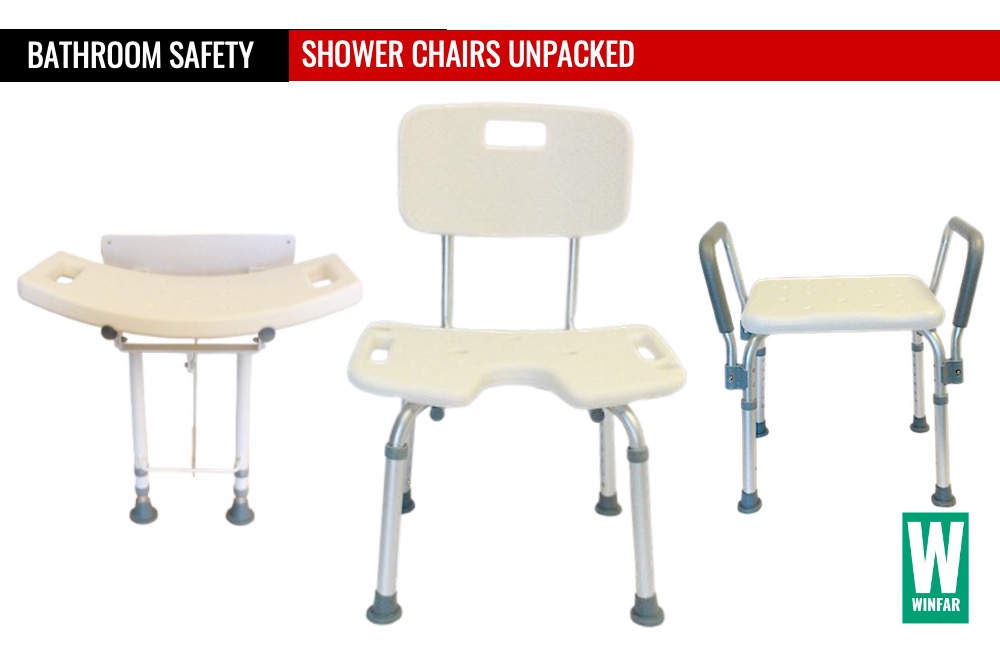A shower chair is more than just a seat—it’s a safety tool that makes bathing easier, safer, and more comfortable. Whether for seniors, people recovering from surgery, or anyone with mobility challenges, the right shower chair provides independence and peace of mind while reducing the risk of slips and falls. So how do you choose the right chair for you?
This is what you need to know –
What Is a Shower Chair?
A shower chair is a waterproof seat that allows someone to sit safely while bathing.
It facilitates independence and reduces the risk of slipping, while making showering more comfortable and stress-free.
Benefits of Shower Chairs
Shower chairs are widely used at home, in hospitals, and in senior living facilities. They:
– Promote independence for seniors
– Provide peace of mind and reduce fear of falling
– Lower the risk of slips and bathroom injuries
– Offer stability and a safe resting spot if the user tires easily
Who Benefits Most?
– Seniors
– People with mobility or balance issues
– Those with chronic illnesses or breathing difficulties
– People who experience fatigue or weakness
Shower chairs are an essential mobility aid, useful for:
– People with permanent or temporary mobility issues
– Those who experience pain when moving
– Anyone who feels unsteady or fatigued during showering
– Those recovering from operations
Most shower chairs are height adjustable (to varying degrees) and include non-slip rubber feet for stability.
Many have armrests and backrests for added support.
Others have reinforced legs for added stability.
The variations are as diverse as your needs.
So start by identifying and listing your needs. Thereafter it is a simple matter of refining according to your needs.
What to Consider Before Buying a Shower Chair
– Size: Measure your shower or tub floor to ensure the chair fits fully on flat ground.
– Height Adjustability: A good chair adjusts to suit your height. Your feet should touch the floor while seated—not dangle.
– Weight Capacity: Standard chairs may not support everyone. If over 300 lbs (136 kg), choose a bariatric model.
– Support Features: Armrests and backrests add comfort and security, especially for those needing extra stability.
Questions to ask yourself:
- Space & Fit:
– Will the chair fit comfortably inside my shower or tub?
– Will it sit flat on the ground without tipping or rocking? - User Needs:
– Do you need extra support from a backrest or
– Would backless be better allowing a caregiver easier access
– Do I need armrests to help me sit/stand?
– Do I need a narrow or wider seat? - Cleaning & Hygiene:
– Would a U-shaped opening be beneficial for cleaning or aid your caregiver? - Mobility & Access
– Would wheels (rolling chair) make it easier for me or a caregiver to move me safely?
– Do I need the chair to swivel for easier transfers in and out?
– Should the chair be foldable, so someone else can also use the shower without impediment? - Caregiver Involvement
– Will a caregiver be helping me, and do they need open sides or space to assist with washing?
– Does the chair design allow for easy access without straining the caregiver? - Adjustability & Stability
– Is the chair height-adjustable so my feet can rest flat on the ground?
– Do I need a bariatric chair with higher weight capacity for safety?
– Are the feet non-slip and rubberized for wet conditions?
Types of Shower Chairs
1. Standard Shower Chair
– Four rubberized feet, wide seat, backrest, and armrests
– Provides strong support and comfort
Examples include: Standard Shower Chair with back
Variations include: U Shaped Shower Chairs – for easy cleaning and improved personal hygiene care
2. Commode Shower Chair (with Wheels)
– Essentially a standard commode chair – waterproof – with lockable wheels
– Especially useful for people with severe mobility impediments, who use wheelchairs or would otherwise need to be transferred
Examples include: https://winfar.co.za/commode-shower-chair-blue-with-wheels/
3. Bariatric Shower Chair
– A reinforced version designed for users over 300 lbs (136 kg)
4. Fold-Down Shower Chair
– Mounted permanently to the shower wall
– Folds up when not in use — ideal for shared bathrooms with limited space
Examples include: Wall Mounted Shower Chair
5. Shower Stools
– Can be used in the shower or bath
– Height adjustable with stable base secured with anti-slip tips
– Can usually extend beyond average height, making it suitable for taller persons, and those recovering from hip operations
Examples include: Height Adjustable Shower Chair; Reinforced Shower Bench
Variations: Bath stool with swivel seat
👉 If you have a disability or specific diagnosis, speak with an occupational therapist to find the best option for your needs.

